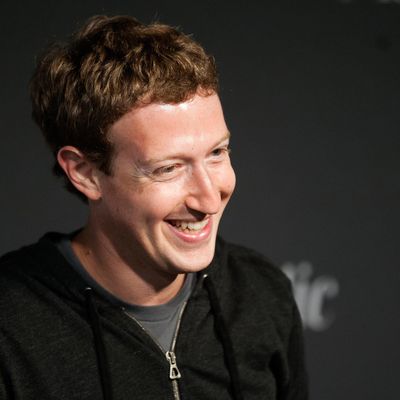
There are a lot of numbers flying around in attempt to explain Facebook’s huge spending — $12 billion in stock, $4 billion in cash, and $3 billion in restricted stock units — on messaging service WhatsApp: 450 million active users, 1 million new users a day, 600 million photos sent every 24 hours, etc. Yes, WhatsApp is huge worldwide, but $19 billion huge? The tech press is attempting to fight it out today in another round of its favorite game: Second-guess Mark Zuckerberg or Defend His Vision.
Leading the “Sure, why the hell not” camp is Business Insider’s Henry Blodget, who acknowledges that it’s a “a staggering amount to pay for a company with estimated 2013 revenue of only $20 million,” but prefers to think of the acquisition as “very bold.” It’s the right mix of defense and offense, says Blodget:
WhatsApp is the fastest-growing company in history (in terms of users). If the company’s growth continues, and it can continue to “monetize” its users, it will be worth an even more mind-boggling amount of money someday. At the same time, WhatsApp’s growth is gobbling up user messaging and connection time that once could have belonged to Facebook. Now those users and their time do belong to Facebook. So buying WhatsApp allows Facebook to both own “the next Facebook” and prevent “the next Facebook” from eating Facebook’s lunch.
As for that eventual monetization, David Goldman at CNN Money writes optimistically about the someday revenue:
With its $1 annual subscription fee, 1 billion users would translate into significant revenue for Facebook. “Large scale networks like WhatsApp are rare and provide significant monetization opportunity, justifying their valuation over time,” said Robert Peck, analyst at SunTrust Robinson Humphrey.
Writing from Rwanda, the TexIt Blog gets at WhatsApp’s international popularity by highlighting its reach in the developing world:
See, WhatsApp wasn’t born in Silicon Valley on an iPhone, rather it fought its way to a $16B exit by providing an awesome messaging experience to the middle billion, those living on $10 a day. And you know what, on $10 a day you probably don’t have an iPhone or an Android handset. Rather you are probably carrying around a “feature phone”, one of a thousands variations of handsets built by Nokia or Samsung running a version of Java 2 Mobile Edition.
That was the genius of WhatsApp really, they recognized that messaging apps are all about network effects and instead of focusing on the comparatively small market of the ‘developed world’, instead targeted the other 3 billion people who don’t have smartphones. And at that they have been supremely successful.
Steven Russolillo of The Wall Street Journal asks analysts about the “sticker shock,” and Jordan Rohan from Stifel Nicolaus justifies the purchase as defense against Google:
Facebook has with the acquisition of Instagram and WhatsApp muted the strategic risk of Google acquiring its way into social media and communications in a real way. We believe Facebook shares would have been pressured by more than single-digit percentages…if Google had purchased WhatsApp instead.
Another analyst added, “We believe the price may have been driven up by interest from other major competitors, most likely Google and potentially Apple.”
BuzzFeed’s John Herrman went so far as to call it an “existential threat”:
It was one of the only services that could plausibly claim to be cannibalizing Facebook on a large scale, and one of a small few that pose to it an existential threat.
There are other popular messaging apps, and perhaps none is more popular than Facebook’s (if you include the primary FB app). But over the last year, the rise of apps such as WhatsApp, WeChat, Kik, Line, and Viber have left the incumbent tech giants somewhat stunned.
On the other side is Slate’s Matthew Yglesias, who argues that WhatsApp is only necessary and effective in a world where the big mobile carriers just haven’t caught up yet. Eventually, he argues, they will tweak their system, rendering the outside messaging service useless:
… if WhatsApp gets big enough, then carrier strategy is going to change. You stop selling separate SMS plans and just have a take-it-or-leave-it overall package. And then suddenly WhatsApp isn’t doing anything. […] The more people who exploit the loophole, the more sense it makes for the carriers to change the system.
Also in the anti- camp is Dealbook/Reuters columnist Robert Cyran, who weeps for the Facebook shareholders as Zuckerberg chases growth instead of revenue and that playing defense is for losers:
Facebook says growth is the point, not making money. That’s the kind of magical thinking shareholders signed up for when they surrendered control to the founder.
Deals escalating in size, and seeming desperation, since the $1 billion gulp of Instragram are a worrying signal that Facebook is looking in the rear window, playing defense, rather than innovating in its own right.
And then there’s Felix Salmon of Reuters, who says whether or not Facebook overspent is beside the point:
If you’re asking whether Zuckerberg paid too much for WhatsApp, you’re asking the wrong question. Zuckerberg is sending a message, here, that Facebook will never stop in its attempt to dominate mobile — that no amount of money is too much. Zuckerberg has money — and, thanks to the IPO, he can even print money, if he wants, by issuing new Facebook stock. He’s playing large-stack poker, and he’s playing it in textbook manner. I, for one, wouldn’t want to be competing against him.





























